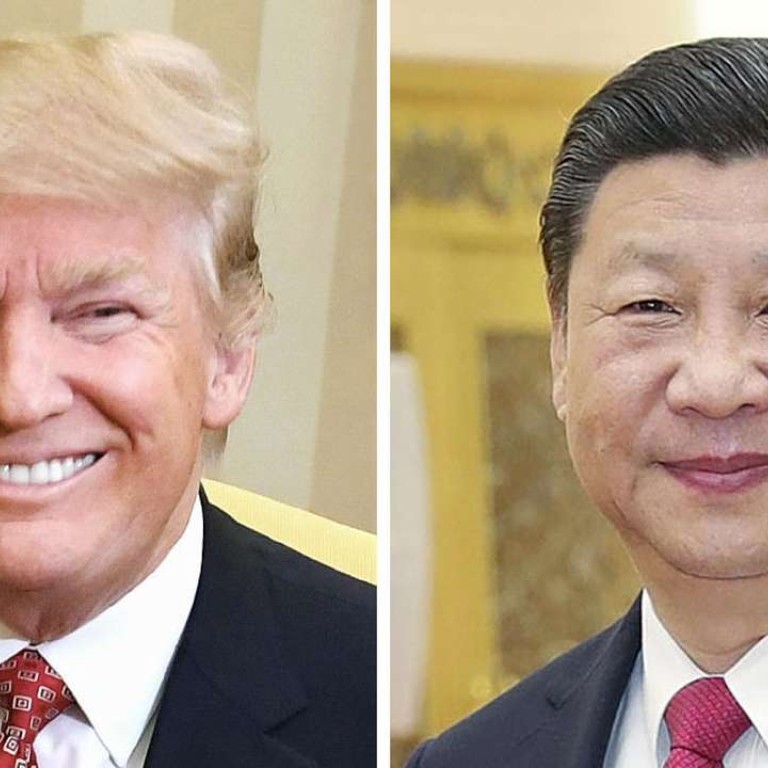
Trump vs Xi: prepare for a clash of views on big global issues
When the first summit between Xi Jinping and Donald Trump goes ahead in Florida this week, it will set the stage for a clash of world views on a range of international issues from globalisation to free trade
When the first summit between Chinese President Xi Jinping and his US counterpart Donald Trump goes ahead in Florida this week, it will set the stage for a clash of world views on a range of international issues from globalisation to free trade.
On globalisation
Trump’s America-first agenda and desire to reduce the US’ global leadership comes as China is extending its reach around the world.
Just a few days before Trump’s inauguration in January, Xi told the World Economic Forum in Davos, Switzerland, that “just blaming economic globalisation for the world’s problems is inconsistent with reality, and it will not help solve the problems”.
Don’t blame globalisation for world’s ills, Xi Jinping tells Davos
That contrasted with Trump’s inauguration speech pledge to put America’s interests first and bring jobs back to the United States.
“We’ve made other countries rich while the wealth, strength, and confidence of our country has disappeared over the horizon,” Trump said.
On free trade and foreign investment
China has been expanding its global footprint with its Silk Road initiative and will host a major summit to realise the plans in Beijing in May. It is also leading the push for a free-trade deal between Asean and various countries under the Regional Comprehensive Economic Partnership banner, and sent representatives to Chile for a Trans-Pacific Partnership (TPP) meeting, triggering speculation that Beijing is angling to replace the US in the trans-Pacific trade deal.

At Davos, Xi said: “We must remain committed to promoting free trade and investment through opening up and say no to protectionism. Pursuing protectionism is like locking oneself in a dark room. While wind and rain may be kept outside, so are light and air.”
Trump said the TPP was a close second to the North America Free Trade Agreement as the worst trade deal ever.
“For many decades, we’ve enriched foreign industry at the expense of American industry,” Trump said on the day he was sworn in as president. “One by one, the factories shuttered and left our shores, with not even a thought about the millions upon millions of American workers left behind.”
On the European Union
Trump said Britain’s decision to leave the European Union was a “great thing”, calling the bloc a “vehicle of Germany” and has openly criticising German Chancellor Angela Merkel for her government’s openness to asylum seekers.
“I believe others will leave. I do think keeping it together is not going to be as easy as a lot of people think,” Trump said.

But ties between Europe and China have grown stronger, and Xi and other Chinese leaders have also stated clearly Beijing’s support for a united European Union.
“China hopes to see a prosperous Europe and a united EU, and hopes Britain, as an important member of the EU, can play an even more positive and constructive role in promoting the deepening development of China-EU ties,” Xi said on his trip to Britain in 2015.
On Middle East policy
China has limited its role in the Middle East and avoided taking sides in conflicts, despite its reliance on the region for oil. But China is stepping up engagement with Middle East nations recently.
“China and the Islamic countries have respected each other and carried out win-win cooperation for a long time, setting an example of harmonious coexistence of different civilizations,” Xi said when receiving Saudi Arabia’s King Salman on March 16.
The US, by contrast, has triggered controversies regarding the region. The Trump administration has imposed travel ban on seven Muslims majority countries.
On North Korea and security in Northeast Asia
North Korea is the Trump administration’s top security concern in East Asia.
China, which sees North Korea as a buffer zone against US military and political influence in Northeast Asia, has over the years resisted US demands to impose tougher sanctions on Pyongyang despite its increasingly aggressive nuclear and missile programme.
“North Korea is behaving very badly. They have been ‘playing’ the United States for years. China has done little to help!” Trump tweeted on March 17.
Chinese officials said Beijing did not want chaos in the Korean peninsula and called on Pyongyang to stop provocations, but insisted the nuclear issue should be settled through negotiation.

